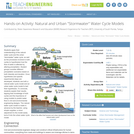
Students apply their understanding of the natural water cycle and the urban "stormwater" water cycle, as well as the processes involved in both cycles to hypothesize how the flow of water is affected by altering precipitation. Student groups consider different precipitation scenarios based on both intensity and duration. Once hypotheses and specific experimental steps are developed, students use both a natural water cycle model and an urban water cycle model to test their hypotheses. To conclude, students explain their results, tapping their knowledge of both cycles and the importance of using models to predict water flow in civil and environmental engineering designs. The natural water cycle model is made in advance by the teacher, using simple supplies; a minor adjustment to the model easily turns it into the urban water cycle model.
- Subject:
- Applied Science
- Engineering
- Hydrology
- Physical Science
- Material Type:
- Activity/Lab
- Provider:
- TeachEngineering
- Provider Set:
- TeachEngineering
- Author:
- Andrew O'Brien
- Austin Childress
- Carleigh Samson
- Maya Trotz
- Ryan Locicero
- Date Added:
- 09/18/2014
